- Home
- M. K. Hume
Prophecy: Death of an Empire: Book Two (Prophecy Trilogy) Page 26
Prophecy: Death of an Empire: Book Two (Prophecy Trilogy) Read online
Page 26
‘What this man has done to our master is more than enough, thank you, mistress,’ Finn protested. ‘But why would anyone want to hurt him? I’d have thought that the people of Rome would respect healers, not harm them.’
Myrddion flushed with shame and Pulchria knew at once the reason for his injuries. Her hand lingered gently in his damp hair as she smoothed it back from his forehead. ‘Your master is too handsome, lads. He excites envy and lust just by being alive. I think someone with fighting skills has tried to seriously hurt him.’
Cadoc’s blunt, soldier’s fingers had found small green-stick cracks in two of Myrddion’s ribs and the bone across his shoulder. He shook his head, unable to fathom how a man’s male beauty could bring such punishment down on his head.
‘In your own words, master, I’ll have to hurt you just a little.’
‘But no poppy, Finn. I want to watch what you two are about when you’re working on my body,’ Myrddion hissed through gritted teeth.
Quickly and efficiently, his ribs were bound tightly, no other treatment being possible for such injuries. The shoulder bone was manipulated back into line, and his upper arm was strapped against his body and then eased into a sling. Myrddion only groaned when Cadoc hurt him, but Pulchria felt his pain more acutely than he did and wept silent tears of sympathy. She had become very fond of this beautiful young man after only a few hours in his company.
‘I managed to cut Ferreus with my scalpel – twice. I made a very obvious cross with the blade so I would recognise him if ever I saw him again. I lost my temper, Cadoc, and said such dreadful things to him. I told him that he’d be thrown from a rock and the fish of the Tiber would be eating his eyes within a week. How could I place such a prediction on anyone?’
‘He deserved it,’ Finn answered economically. ‘Now you’ll drink this water with a little poppy in it so that you can sleep. No, master, I’ll accept no excuses. I’m your herb apprentice, so you will obey me.’
Myrddion was puzzled as well, a concept that added to his emotional turmoil. The curse had come so easily to his tongue that he had to consider that it came from the same place in his soul as his prophecies, except that in this case he remembered every word he had spoken. His head spun in confusion.
Myrddion drank the draught, but as he drifted off into a drugged sleep it did not prevent him from despairing of setting up his healing reputation with his left arm out of action for at least six weeks. Fortunately, he did not dream.
When Myrddion awoke, not only were the widows fussing over him, but Pulchria was adding her mite as well. Because of her injured leg, Bridie confined herself to combing and braiding Myrddion’s long hair and binding it with woollen bands, ostensibly to prevent it from knotting at the base of his neck. Rhedyn cleaned the men’s apartment with thorough ferocity that impressed Pulchria mightily, while Brangaine, with Willa in tow, produced a stew and flat bread she had miraculously prepared on her simple iron hearth.
As for Pulchria, she was in charge of gossip. The local streets were buzzing with news of the incident, although such a minor fight would normally have been soon forgotten had it not been for the tragic sequel. Ferreus had struggled with the guard and those fists, so used to dealing out damage to human flesh, had struck a patrician centurion just under the jaw, breaking the young man’s neck. The unnamed officer had died instantly, and Ferreus had been dragged away.
‘I’m sorry that Ferreus killed someone, but I’m not surprised. When he hit me, it felt as if I was being struck with an iron bar. By the gods, he only dealt me three blows and he broke a bone each time. Where is he now?’
‘That’s the whole point, master. You said he’d be thrown from a rock and fish would eat his eyeballs. It is now common knowledge that he’s set for execution at the Tarpeian Rock in the old way.’
Myrddion shuddered. He had never heard of the Tullianum Prison, or the Tarpeian Rock that hung over the Forum, but to die in this way seemed a terrible thing. Pulchria gazed at her tenant with an expression composed equally of affection and awe.
‘The whole district is talking of nothing else, young sir. It seems we’ve a soothsayer and a healer all rolled up in one. They’ll flock to our door just to see what you look like.’
Myrddion closed his eyes with distaste. Without his volition, rage had unlocked something in his head. Well, no matter, he thought. It’s too late now to regret it.
‘Cadoc, get the shop in order with Brangaine. She’s a genius at putting things to rights. Our first customers will be here shortly, so we need to put on a brave face. I’ll dress and join you. Can you help me dress, Rhedyn? Finn can assist at the door. Bridie, find me something clean to wear. The people of Rome want to see a show, so let’s give them one.’
Bridie hobbled away and returned with a black cloak which sported a narrow collar of fur, a black tunic and a grey robe. Proudly, she presented her handiwork to her master, and Myrddion thanked her with a child’s awe and gratitude.
‘Where did you get the fur, Bridie? It’s beautiful.’
‘You can thank Finn and Cadoc for it, master. When the apprentices were stealing . . . er, finding our horses on the night we left the Catalaunian Plain, they stumbled over the body of a Hun officer wedged into a narrow fissure in the ground. He must have been wounded and crawled away to die. What was one more theft . . . liberation, I mean, after so many others? They stripped the body of its wealth and this fur was around his cloak.’
The fur was thick, soft and the colour of very dark mahogany in the light. Myrddion stroked it and struggled into his new clothes, after Bridie had pottered away with her odd, hopping step to fetch his boots, which had been freshly cleaned. With a pang of affection, Myrddion realised that every tiny hand-stitch in his new clothes had been an act of love. He was humbled.
Once he was dressed, Bridie returned with the boots and a belt of heavy leather, bound with small brass plates that had been polished until they shone like gold. A scabbard decorated with some form of hunting cat was attached, with a knife of particular sharpness and beauty sheathed within it.
‘You’ll not have to use your surgical knives in future, Master Myrddion.’
‘But Bridie, this belt and weapon should belong to Cadoc and Finn. They found them, so the spoils are theirs.’
‘Don’t worry your head about them. They have his purse and jewels. I know they didn’t tell you about the valuables at the time, Master Myrddion, you being a little touchy about robbing the dead, but otherwise that dreadful Aetius would have added these mites to his treasure . . . and he’s got more than enough. Please don’t be angry with them, master.’
Bridie stared up at him with such anxiety that Myrddion felt like a brute. ‘I’m sorry, Bridie. Whatever Cadoc and Finn found on the Catalaunian Plain is theirs, by all the rules of war, since time beyond counting. I’m grateful for the fur collar, and Ceridwen knows how much I need to go armed, so I’m not angry at all. In fact, I’m touched that you all care about me.’
‘But we love you, master. Didn’t you know? You cared for us when no one else saw any value in our existence. You’ve given us a trade . . . so we rely on you. Now, no more of your jibber-jabber. There is only one last detail we have to complete and you’ll begin to set all the tongues in Rome a-wagging. Hold still – for just a moment.’
‘Ow!’ Myrddion bellowed in surprise as well as pain. Bridie had driven a thick needle through the lobe of his ear. ‘What was that for?’
‘Very still, master, and the bleeding will stop presently. There . . . very still. Done. Finn was right. It looks wonderful.’
Myrddion’s ear was hurting, and when he explored it carefully with his right hand he discovered that Bridie had driven an odd-shaped spike through his earlobe. Instead of the usual ring or stud that men sometimes wore, Myrddion’s jewel was a small arrowhead of gold, electrum and ruby chips, with a shaft that went through the lobe and then hooked back to attach to the top of the shaft for stability. When Myrddion examined his reflection in a bowl of
water, he felt a frisson of pleasure. With his dark hair and eyes, the bejewelled spike made him appear exotic and dangerous.
Myrddion smiled and Bridie’s face lit up as if a lamp glowed behind her pale skin. ‘Do you like it, master?’
‘I do, Bridie, although it hurts. I hope you boiled the earring and your needle?’
Bridie was so happy that she actually punched her master lightly on his good arm with her small fist. Then, realising what she had done, she flushed with embarrassment. ‘Of course, master. How could I serve you without learning your ways?’
With an urge to preen that was quite new to him, and his left arm loosely resting in a white sling, Myrddion descended the stairs to the shop, which was now laid out as a makeshift surgery and apothecary’s shop. The folding battlefield table was in position and built-in shelves housed Myrddion’s jars of salves, drawing poultices and painkillers. The many bunches of herbs and small pails of chopped roots that had been dried during their journey were either hung from the ceiling or piled in rush containers on a rickety table. The baskets of rolled bandages were neatly stacked along one wall, as were the many boxes of boiled rags that had been prepared for service over the preceding months.
The room also boasted two stools of doubtful origin and strength, another low table that Cadoc had used to lay out Myrddion’s surgical tools, and his precious chest of scrolls. The crudely tiled floor had been scrubbed clean and swept until no dust dared to make an appearance and even the rather dingy walls had been washed. Dimly lit, because the large exterior doors were still closed, the healer’s surgery was as professional and as clean as the three dedicated women could make it.
Myrddion surveyed his small kingdom with elation. His fingers caressed the large pottery water jars and he wondered where Cadoc had found them. The apprentice had also discovered a small terra cotta and iron stove that would be used to heat water or cleanse wounds with fire. Even though the shelves were sparsely stocked, Myrddion’s fertile imagination filled them with row upon row of the many herbs and simples that his trade demanded. Filled with hope, he was eager to begin purchasing more of the raw materials that were so essential to his craft.
‘Open the doors, Brangaine, and let’s satisfy the curiosity of any patients who need our services. I feel like a king today in this strange and dangerous place, and I’m happier than I have ever been in my whole life. I am deeply in your debt, my friends, and I don’t know how to repay you.’ Then he grinned irrepressibly. ‘But I’m sure you’ll think of something.’
Red-faced, shuffling and pleased, his five companions accepted their master’s gratitude with protestations of devotion and duty. Then Brangaine swung the two doors wide open, letting in the brilliant morning sunshine.
‘And so it begins,’ Myrddion shouted with a joy nearly as incandescent as Bridie’s face and the wide, white smiles of his apprentices.
CHAPTER XII
THE GARDEN OF PAIN
From the moment the wooden doors of Myrddion’s first clinic were thrown open, a crowd gathered, several persons deep, to peer into the premises in order to catch a glimpse of the barbarian who had predicted the death of Ferreus. In the subura, word spread like wildfire from tenement to tenement, and the new occupants of Pulchria’s building were far more interesting than the unvarying routines of poverty. They came – men, women and children – to stare blatantly through the doors in the hope of gossip, entertainment or, in some cases, an understanding of the reasons for their many bodily ills.
All day, a steady stream of patients, gawkers or personages of importance passed through Myrddion’s doors. As the long hours advanced, the healer worked to the point of exhaustion, his cracked ribs protesting every time he bent to examine rotted teeth or asked a crying child to show him the cuts, abrasions or wasted limbs that had brought its parents to his clinic. Cadoc and Finn did all the hard physical work, washing instruments and drawing teeth, and even, under Myrddion’s direction, setting simple broken bones. In a multi-coloured, multi-racial stream, the denizens of the subura flocked to the small shop-front with every ailment that Myrddion knew and a frightening number of symptoms that he didn’t.
Several family members presented in a very emaciated condition, although there was no lack of food available. The distraught parents swore that their children had lost their appetites and could only be tempted by sweet treats that they frequently vomited up as soon as they had eaten them. The children were listless, very small for their age and slow in their responses to his questions.
Myrddion prescribed a purgative herb and forbade the parents to permit the children to eat the sweetmeats they craved, asking them instead to provide them with fresh fruit, vegetables, eggs and meat. Privately, the healer knew that the parents were unlikely to be able to do so, for unfortunately the poor had little money to purchase the bare essentials of life.
More worrying were four adults who complained of blinding headaches that prevented them from carrying out the most basic of tasks. These chronic patients had visited many other healers but had received no lasting relief from their symptoms. After observing the patients closely, Myrddion noticed a common affliction with all four patients – that they were having difficulty walking. The gait of each was unsteady and all four had a peculiar walk in which the front of the foot took most of the weight. They were also having similar difficulties with their hands, so Myrddion deduced that something was causing problems with their tendons. He offered pain relief for their headaches, but the underlying cause remained a total mystery to him. His brows knit with perplexity, for although he consulted the scrolls until his eyes ached with strain, he was unable to offer even an elementary diagnosis for such a large group of patients. Failure settled over his shoulders like a cloak of frustration.
Even so, the healers accepted payment for their services, initially a uniform amount, but soon adapting the fees to fit differing financial needs of their patients. Myrddion refused to deny treatment to ragged slum-dwellers with nothing to give. Still, he understood the emasculating nature of charity and agreed to accept whatever payment his patients could afford at a time when they were in a position to pay for his services.
At the end of the first day, the healers had amassed a small store of silver and bronze coins, several eggs, a brass ring, a basket of ripe olives, a tiny stone carving of a household god and a small bird in a wicker cage. As the tiny creature would never survive if it was set free, and was far too small for eating, Willa was given the yellow bird to feed and to love.
Willa was now at least three years old, with burn scars much like the injuries Cadoc bore, but she lacked his natural ebullience and was a self-contained, mute little girl. Months ago, Myrddion had established that there was no physical damage that prevented the child from speaking; her silence was more likely to be caused by the trauma of her injuries and the death of her mother. Willa took one look at the dejected bird and then, like the sun finally emerging from rain clouds, her face broke into a wide smile and she went in search of water for the tiny creature.
After the second day of solid work, their store of coins had increased and Myrddion’s perplexity regarding his undiagnosed patients was deeper. Among the stranger forms of payment for their services, they had received a small bunch of radishes and peppers and, inexplicably, an orange tree in a pot. It was a tiny, malnourished thing, but Myrddion accepted it with grateful thanks before giving it to Pulchria. She was delighted, and promised to plant it in the central atrium where it would grow and thrive.
Day followed day in the same unvarying pattern of illness and pain.
Myrddion discovered that he could ease the suffering of many of his patients, but life for the poor underclass of Rome was far more dangerous than in any city he had ever known. As the heat of summer beat down on the stone of the city, causing the roughly cobbled streets to become painful underfoot, illness flourished in the subura, breeding in piles of rotting refuse and excrement and spread by the flies that swarmed over the detritus of Rome. Children ca
me to Myrddion with suppurating eyes and sores turned septic from poor hygiene. To his utter dismay, one hysterical mother brought in a babe with nasty bites all over its body. The healer recognised those tooth marks immediately. Rats had tried to devour the infant as it slept.
At night, by the light of his precious oil lamp, Myrddion kept notes of the strange ailments that he saw daily. But observation and recording weren’t enough. Somewhere in this teeming mass of humanity was the man he sought, Isaac the Jew, although none of the people of the subura had ever heard his name. Myrddion waited impatiently, hoping that Isaac might hear of him and, out of curiosity, seek out a fellow healer. However, after the first month in Pulchria’s tenement without hearing anything of his elusive quarry, Myrddion began to despair.
Nor had Myrddion forgotten his father, the mysterious Flavius who had given him life so carelessly and so brutally. But the Flavian gens was huge, and many scions of the family were spread throughout the Roman world. As surreptitiously as possible, Myrddion sought news of a man called Flavius who would be in his forties or fifties, but without further information to support his search his enquiries came to nothing.
Perhaps Myrddion would have wearied of the ugly life of the subura and become restive for the excitement of life on the road and the battlefield. But destiny came knocking at Myrddion’s door once more when two vaguely familiar men presented themselves at his shop-front at the end of a long procession of patients.
Myrddion was treating a carbuncle on a sandalmaker’s neck when the two burly men walked deferentially through the double doors. The sandalmaker flinched at the sight of the strangers and their long staves, so Myrddion finished with the nasty swelling as quickly as possible and called Finn to apply a drawing poultice. Then, after washing his hands in hot water, he turned to face his visitors.
‘How may I be of service?’ he asked, wincing as he eased his left shoulder back into the sling that offered relief when he wasn’t working.

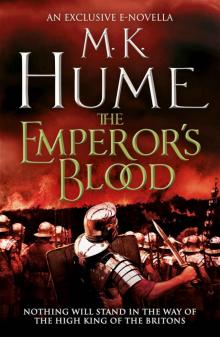 The Emperor's Blood (e-novella)
The Emperor's Blood (e-novella)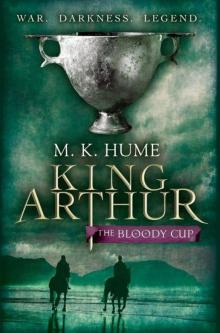 King Arthur: The Bloody Cup: Book Three
King Arthur: The Bloody Cup: Book Three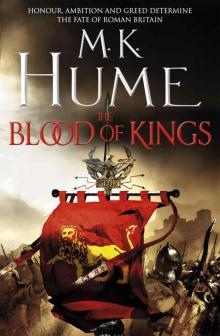 The Blood of Kings: Tintagel Book I
The Blood of Kings: Tintagel Book I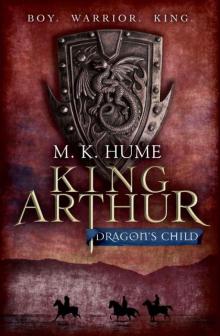 King Arthur: Dragon's Child: Book One (King Arthur Trilogy 1)
King Arthur: Dragon's Child: Book One (King Arthur Trilogy 1)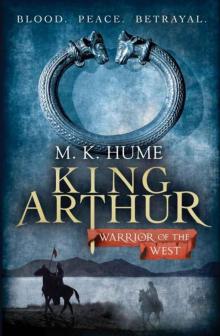 King Arthur: Warrior of the West: Book Two
King Arthur: Warrior of the West: Book Two The Storm Lord
The Storm Lord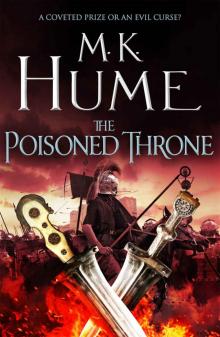 The Poisoned Throne: Tintagel Book II
The Poisoned Throne: Tintagel Book II![M. K. Hume [King Arthur Trilogy 04] The Last Dragon Read online](http://i1.bookreadfree.com/i2/04/07/m_k_hume_king_arthur_trilogy_04_the_last_dragon_preview.jpg) M. K. Hume [King Arthur Trilogy 04] The Last Dragon
M. K. Hume [King Arthur Trilogy 04] The Last Dragon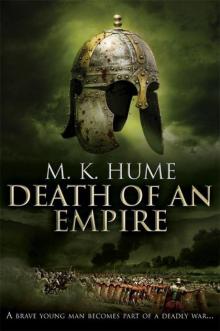 Prophecy: Death of an Empire: Book Two (Prophecy Trilogy)
Prophecy: Death of an Empire: Book Two (Prophecy Trilogy)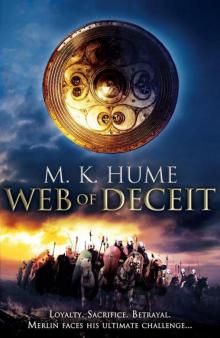 Prophecy: Web of Deceit (Prophecy 3)
Prophecy: Web of Deceit (Prophecy 3)